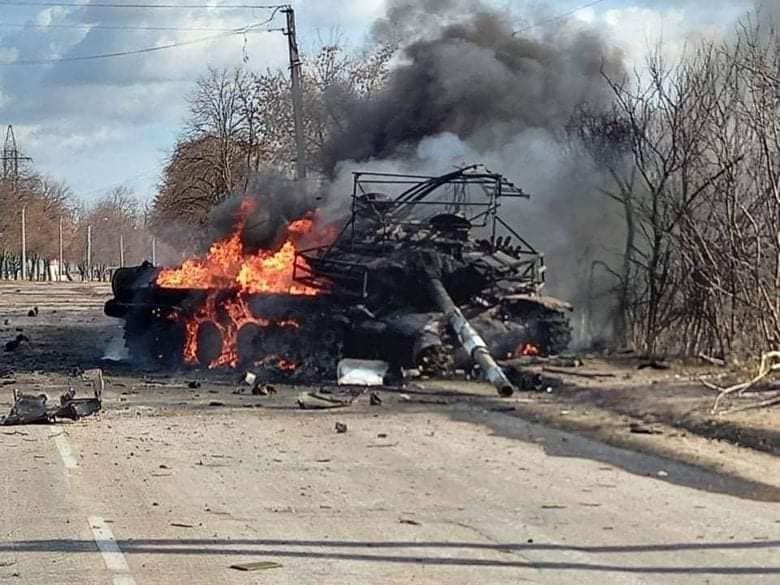Could EU membership for Ukraine be a helpful piece of a peace deal with Russia?
By Aleksandr S. Kolbin | March 3, 2022
 Credit: General Staff of the Armed Forces of Ukraine official Facebook page
Credit: General Staff of the Armed Forces of Ukraine official Facebook page
On February 28, 2022, Ukraine President Volodymyr Zelensky, while besieged in Kyiv by Russian forces, signed Ukraine’s appeal to the European Union, urgently requesting admission of Ukraine to the EU “under the accelerated procedure.”
On the same day, an EU representative, on condition of anonymity, said that, as a rule, after receiving such a request, the European Commission provides its opinion in 15 to 18 months. However, the representative said, “it could be longer and much faster, given the political necessity.” That said, one of the reasons why this is especially important for Zelensky today may be that such an appeal could potentially be used in discussions with Russia to find a way out of the conflict. Subsequent reports suggested that European Union leaders may discuss the possibility of Ukraine’s membership at an informal summit in March.
Indeed, the topic of Ukraine’s accession to the European Union “under the accelerated procedure” has a significant potential for assisting moves toward a peaceful settlement.
In the most general terms, this potential could be realized in either of two mutually exclusive options, one of which could almost completely satisfy the interests of the Russian Federation, given its earlier stated requirements, and also satisfy Ukraine’s long-term desire to become an EU member. Another would contain the threat of escalation of the war now under way, but it would probably fully meet the aspirations of the Ukrainian leadership.
Option one: The deal. According to Russian statements, the goals of Russia’s special military operation on the territory of Ukraine are the “demilitarization” and “denazification” of this Western neighbour. The acceptable result for Russia could be the unconditional acceptance by the Ukrainian leadership of Russia’s demands for recognition of the independence of the Lugansk and Donetsk People’s Republics, an agreement that Crimea is a part of Russia, and the acknowledgement by Ukraine that it would have a “non-bloc military status” (meaning that it would not join NATO).
The Ukrainian leadership is unlikely to accept those demands without meaningful compensation. In this regard, the following option of satisfying Ukrainian society’s “European aspirations” could prove to be appropriate. The European Union could indeed agree to an accelerated membership procedure in the case of Ukraine, provided that Ukraine renounces claims for the Donbas region and Crimea and assumes a commitment to a non-bloc military status of the country. What is the logic behind that? First, the EU has never posed a military threat to Russia, and Russia never perceived it as such. Second, to put it bluntly, the operation launched by Russia virtually eliminates the possibility for a successful reintegration of the Donbas region (as the Minsk Agreements envisaged it) into Ukraine in the long-term perspective. Third, the issue of Crimea is “closed” for Russian leadership, as Russian officials have publicly stated several times (unless the West is ready to fight for Crimea on the ground). Again, I admit this logic is blunt, but it is accurate, and it can lay the way for longstanding peace in Ukraine (not mentioning it can help prevent further escalation in Eastern Europe).
At the same time, with Ukraine’s commitment to a non-bloc military status, Ukraine’s membership in the EU would also become a guarantee of the country’s security, which the Ukrainian authorities so insistently and repeatedly asked for. Such guarantees can be provided, say, through some “non-aggression against Ukraine” or “Ukraine’s neutrality” agreement between NATO and Russia (or CSTO) that would include a promise by the signatories not to engage in military action against Ukraine should it adhere to neutrality. Some guarantees could also be elaborated within the framework of the EU Common Security and Defense Policy or through the conclusion of separate defense agreements between Ukraine (as an EU member) and another primary EU member like France or Germany (with a clear potential for escalation of any future attempt to attack Ukraine to the level of NATO in each option, which would also be a clear and sound security guarantee).
Option two: A threat.
With all the advantages (and disadvantages) of the first option, the Ukrainian leadership, of course, has the right to refuse any territorial concessions. In this case, the European Union could theoretically try to use the option of accelerating Ukraine’s accession to the EU as leverage against the Russian leadership. In this case, Ukraine would be accepted into the European Union with a statement that Crimea and Donbas are still part of Ukraine.
However, in this case, the European Union would have to be prepared that Russia will consider such a development a direct threat to its own security (with a constant potential for escalation to the NATO-Russia level) and would be ready to take appropriate preventive measures. Those measures would include an attempt to completely isolate Ukraine from Western support by conducting a military operation on the Western border of Ukraine and a sharp increase in the intensity of strikes on Ukrainian critical civilian infrastructure. In this case, another goal of the Russian military operation in Ukraine would be to destroy the country’s economy and industry to deprive it of any “European perspectives.”
Here, I have tried to outline only the general framework of a possible deal. On a first read, it may seem like a message to Ukraine that says, “surrender, or make a proposal for a settlement that results in your destruction.” But given the refusal of NATO and the United States to defend Ukraine on the ground, and given the clear statements made by Russia several times that it will not reconsider its decisions regarding Crimea and the Donbas region, in my opinion, the first option described here may have a significant peacekeeping potential. And I hope this proposal will be followed by others.
Together, we make the world safer.
The Bulletin elevates expert voices above the noise. But as an independent nonprofit organization, our operations depend on the support of readers like you. Help us continue to deliver quality journalism that holds leaders accountable. Your support of our work at any level is important. In return, we promise our coverage will be understandable, influential, vigilant, solution-oriented, and fair-minded. Together we can make a difference.
Keywords: EU, European Union, Russia, Ukraine, peace agreement
Topics: Nuclear Risk















To be honest, EU membership is out of the question because the country does not satisfy the conditions for membership: https://european-union.europa.eu/principles-countries-history/joining-eu_en. That in itself say enough about Ukraine. It’s sad reality. The current government of Ukraine resembles the style of a bunch of oligarchs running a country. This resembles something like what we see in Russia, with a weak president. Corrupt and plutocratic. This has to change. I feel sorry for the Ukrainian people. I like to propose a different option. Option three: Neutral Ukraine. Declare Ukraine a neutral country. Maybe in line with the deal Finland has with Russia.… Read more »
Tabula rasa.
Option One conveniently leaves out any motivation of Russia, leaving out the original promise for Nato to not move East, again in 1999, again in ’08, the kerfuffle of 2014– Yes Putin is a war criminal. Yes, the invasion should and is roundly condemned.
Are we goldfish, with no memory longer than 10 seconds ago?